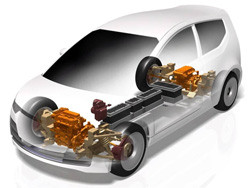The third generation of electric vehicles
Electro mobility has emerged as a promising area for progress towards the modern societal challenges of sustainable transportation and overall global sustainability. The new electric components and technology of electric vehicles offers decreased emissions and traffic, as well as an unprecedented freedom of design, moving away from the conventional vehicle model. The objective of the joint EU research project 'Advanced Electric Vehicle Architectures' (ELVA) was to explore the expanded potential of vehicle architecture. This is on account of the electric drivetrain and further electric mobility technology innovation. The first phase of the project consisted of forecasting future markets. This meant investigating the technological possibilities, customer expectations and requirements, of 2020, the third electric vehicle generation. Determining such options remains a challenge. Technological advances though, as with battery capacity, size, and weight, are expected. Customer requirements seemed to closely resemble expectations of conventional vehicles today, such as safety. Also included in the initial stage was the participation of external institutions through a public design contest. Here, designers were invited to provide their ideas and impact the development of ELVA concepts. ELVA also created three virtual vehicle concepts, led by the involved original equipment manufacturers (Centro Ricerche Fiat, Renault and Volkswagen). These were devised while taking the customer expectations, requirements, and awarded designs of the first phase into account. Assessment of the simulations against key vehicle development criteria, such as ergonomics, and their innovative architecture proved at least comparable, if not greater, to conventional models. Looking towards the future, further scientific and technical research is needed for electric vehicles to successfully infiltrate the European market, but the ELVA project results are referenced by many new initiatives. The knowledge of its findings, due to the involvement of industrial partners, is expected to directly impact the future vehicle development process of the automotive industry. Overall, the goal would be to successfully reconcile customer requirements and sustainable technology advancement.
Keywords
Electric cars, electro mobility, sustainability, technological innovation, transportation



